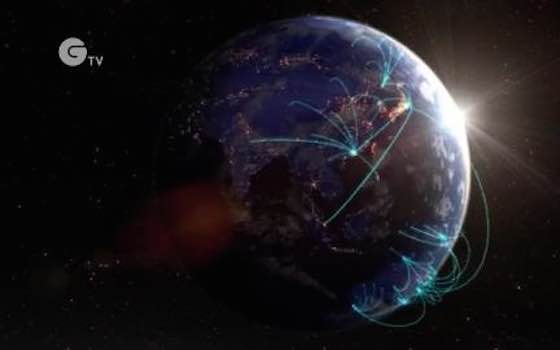- MENU
- HOME
- SEARCH
- WORLD
- MAIN
- AFRICA
- ASIA
- BALKANS
- EUROPE
- LATIN AMERICA
- MIDDLE EAST
- United Kingdom
- United States
- Argentina
- Australia
- Austria
- Benelux
- Brazil
- Canada
- China
- France
- Germany
- Greece
- Hungary
- India
- Indonesia
- Ireland
- Israel
- Italy
- Japan
- Korea
- Mexico
- New Zealand
- Pakistan
- Philippines
- Poland
- Russia
- South Africa
- Spain
- Taiwan
- Turkey
- USA
- BUSINESS
- WEALTH
- STOCKS
- TECH
- HEALTH
- LIFESTYLE
- ENTERTAINMENT
- SPORTS
- RSS
- iHaveNet.com: Environment

Existing technology is already unlocking safer, smarter, greener solutions for powering our economy, transporting our goods, caring for our sick and feeding our growing population.
Addressing climate change requires a combination of technologies and transformative actions across various sectors. Here are some key areas where technology can play a significant role in the transformation needed to mitigate and adapt to climate change:
Renewable Energy
Transitioning from fossil fuels to renewable energy sources, such as solar, wind, and hydroelectric power, is crucial in reducing greenhouse gas emissions. Advancements in renewable energy technologies, including improved efficiency, cost reduction, and energy storage solutions, are essential for scaling up clean energy production and achieving a low-carbon future.
Energy Efficiency
Technology plays a vital role in improving energy efficiency across sectors. Energy-efficient buildings, smart grids, advanced transportation systems, and industrial processes that reduce energy consumption can significantly contribute to reducing emissions and mitigating climate change.
Carbon Capture and Storage (CCS)
CCS technologies aim to capture carbon dioxide emissions from power plants and industrial sources and store them underground. Advancements in CCS can help reduce emissions from existing infrastructure and industries where decarbonization is challenging, facilitating the transition to a low-carbon economy.
Sustainable Agriculture
Innovative technologies in agriculture, such as precision farming, soil management techniques, and crop breeding, can enhance agricultural productivity while reducing greenhouse gas emissions, water usage, and chemical inputs. Sustainable agriculture practices can contribute to climate change mitigation and enhance food security.
Circular Economy
Transitioning from a linear economy to a circular economy involves minimizing waste generation, maximizing resource efficiency, and promoting recycling and reuse. Advanced recycling technologies, product lifecycle assessment tools, and sustainable materials can play a crucial role in reducing emissions and promoting sustainable consumption and production patterns.
Climate Monitoring and Modeling
Technology enables scientists to monitor climate patterns, collect data, and develop climate models that help understand the impacts of climate change and assess mitigation and adaptation strategies. Satellite observations, remote sensing, and advanced modeling techniques are essential for accurate climate projections and informed decision-making.
Digital Solutions
Digital technologies, including artificial intelligence, data analytics, and the Internet of Things (IoT), can facilitate energy management, optimize resource usage, improve transportation efficiency, and enable smart and sustainable cities. These technologies can enhance climate change mitigation and adaptation efforts across various sectors.
It is important to note that while technology plays a crucial role, its deployment needs to be supported by policy frameworks, financial incentives, and societal engagement to ensure effective and equitable transformation towards a sustainable and resilient future.
More Environment & Climate Change ...
- 5 Radical Takeaways from the Pope's Letter on Climate
- A Green-Energy Founding Father
- We're All Taking Dirty Pictures
- Faking It While the World Burns
- This Oil Spill Hits Close to Home
- A Fossil-Fueled Fantasy
- The Pentagon Makes War on Alaska's Pristine Wilderness
- Climate Denial Syndrome Sweeps Wisconsin
- How Climate Change and Resource Scarcity Are Upending World Politics
- Virginia Is for Dirty-Energy Lovers
- Humanity's War on Wildlife
- Making Green Cool Again in Hungary
- David and Goliath in the Amazon
- NASA Warns of 'Megadroughts'
- Our Growing Carbon Emissions
- Global Warming Triggered Syria War
- Round-the-World Solar Flight Takes Off
- 10 Extreme Weather Facts
- New York City Sea Level Rises
- Alaskan Glaciers Disappearing
- Leather Sludge New Bio-Fuel Source
- Why the Ocean is Turning More Acidic
- Why Whales Beach Themselves
- Termites Fight Climate Change
- Gas-Guzzlers On Road To Extinction
- Technology & Transformation
- Ecuador: All You Need Is Love and Oil?
- China Pulls Critical Pollution Documentary Offline
- Forging Our Future
- Green Believers
- The Glaciers Are Talking to Us
- Bald Eagles Nesting In New York City For First Time In 100 Years
- Asian Pollution Messing With U.S. Weather
- Instagram Account Shows Reality of Climate Change
- Keystone Pipeline Would Emit Tons of Greenhouse Gases
- Why You Can't Throw Away Batteries
- Road Salt Is Worse Than You Think
- Arctic Not Cold Enough for Polar Bears
- Doomsday Clock & Climate Change
- Sea-Level Accelerating Faster Than Previously Thought
- 6 Countries Dictate Planet's Future
- Manhattan Size Glacier Breaks Apart
- Opinions Split on Fracking Benefits
- Bad News for Sea Level Rise
- 2014 Hottest Year On Record According To NASA
- While Our Planet Melts, GOP Pleads Ignorance
- The Myth of the Wild
- Plastic Bags are Not a Need - Just a Bad Habit
- Environmental Security: Conflict or Cooperation?
- Beyond The Water-Food-Energy-Climate Nexus
- Climate Change Report Sounds Alarm for Planet Earth
- Genesis, Mother Nature and Environmental Stewardship
- Global Climate Change: Calling All Pagans
- Chicken Little 'Science'
- Climate Change and Interstate Conflict
- Fracking: A Deadly Power Surge
- Inhospitable Earth -- Compared to What?
More Environment & Climate Change ...
"From Technology to Transformation "